Russian opposition leader Aleksei Navalny today walked out of a Moscow jail after serving a 30-day sentence for violating Russia’s restrictive protest laws. He spoke defiantly to journalists waiting outside (above). Navalny vowed to keep fighting against Russian President Vladimir Putin’s government despite the increasing pressure, AP reports.
“I have no doubts that despite these acts of intimidation and terrorizing that are happening now, like arrests of innocent people, this wave (of protests) will grow,” he said, adding that the government’s heavy-handed tactics shows that popular support for the Kremlin is waning. “They feel it, and they’re scared of it.”
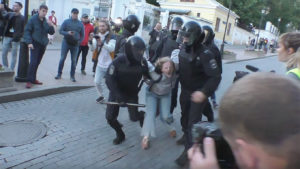
Screenshot Youtube
Putin said this week that the authorities were handling the situation in line with the law and that he did not want protests similar to those inspired by the “Yellow Vest” movement in France, The Times adds. The governing United Russia party’s popularity rating is at its lowest level since 2011, and Mr. Putin’s personal rating has declined because of discontent over falling living standards.
The Moscow protests are not only the largest and most prolonged show of opposition to Putin’s reign since the anti-government demonstrations of 2011 and 2012, they are the most challenging for the regime, says Moscow-based analyst Andrei Soldatov.
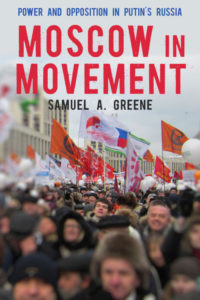 “It’s completely different,” he says. “They have the younger generation. They understand the system gives them no chance to build a successful career. Jobs in big corporations are only for kids with well-connected mothers and fathers. They understand this and they are not interested in the Ukraine and Syria. No one is fascinated anymore by the annexation of Crimea. So the climate is different. I cannot predict what will happen.”
“It’s completely different,” he says. “They have the younger generation. They understand the system gives them no chance to build a successful career. Jobs in big corporations are only for kids with well-connected mothers and fathers. They understand this and they are not interested in the Ukraine and Syria. No one is fascinated anymore by the annexation of Crimea. So the climate is different. I cannot predict what will happen.”
The OCSE should send observers to monitor the forthcoming elections, according to five candidates for the Moscow City Duma (from A Just Russia and Yabloko) and several dozen municipal candidates in for the St. Petersburg municipal councils – all of them officially registered on the ballots for Sept. 8.
“The preparation for the elections and actions by electoral commissions raise serious doubts over whether these elections will comply with the principles of fair competition,” the candidates suggest.
This summer’s demonstrations have a few distinguishing characteristics that suggest Russia has entered a new political era, one that could force the Kremlin into some difficult decisions ahead of upcoming parliamentary and presidential elections, according to Cyrus Newlin and Jeffrey Mankoff, analysts with the Russia and Eurasia Program at the Center for Strategic and International Studies (CSIS):
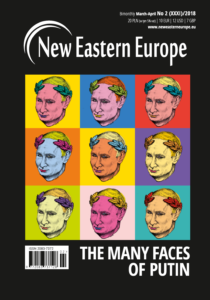 First, protests have been massive. With over 50,000 attendees, the officially sanctioned August 10 protest marked the largest since 2011-2012 Bolotnaya demonstrations. Despite credible threats of arrest, an unsanctioned protest on July 27 drew thousands of protestors, of whom more than 1,000 were detained….
First, protests have been massive. With over 50,000 attendees, the officially sanctioned August 10 protest marked the largest since 2011-2012 Bolotnaya demonstrations. Despite credible threats of arrest, an unsanctioned protest on July 27 drew thousands of protestors, of whom more than 1,000 were detained….- Second, and anecdotally, a wider range of Russians are showing up at protests. While political activism in Russia is often compartmentalized among specific groups (Russians in the 18-25-year old category gave life to the 2017-2018 anti-corruption protests, and last year, pensioners turned out in numbers to protest pension reform), over the past six weekends Muscovites of varied ages and socioeconomic statuses have protested side by side. ….
- Third, protestors appear to hold mixed political views. A medley of signs and political banners appeared at recent demonstrations, underscoring that attendees do not all fall into what we normally think of as Russia’s opposition, for instance, supporters of anti-corruption campaigner Aleksey Navalny. …
- Fourth, the state’s response to protests has been unusually harsh…. The severity of the state response to protests in the Russian capital suggests it understands the political threat posed by growing protests and is determined to stem them.
- I think the biggest problem is that the government did not learn lessons from its failures in elections last year, said Nikolai Petrov, Senior Research Fellow with the Russia and Eurasia Program at Chatham House.
“This is not about any particular politicians coming to power. This is about the government failing to keep its system afloat,” he added. “It could be similar to a certain extent to the recent Ukrainian presidential elections, where somebody from outside could come and change the political system, step by step. And the Kremlin, being aware of this, is tightening the screws.”
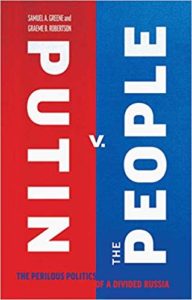 Meanwhile, Russian civil society has developed a more sophisticated strategy that extends beyond simply marching in the street, argues Anna Arutunyan, senior analyst for Russia at International Crisis Group.
Meanwhile, Russian civil society has developed a more sophisticated strategy that extends beyond simply marching in the street, argues Anna Arutunyan, senior analyst for Russia at International Crisis Group.
Movements like those of opposition leader Alexei Navalny have lawyers and volunteers who are legally and civically literate, using their knowledge of Russian laws to organize and hold the government accountable, she tells World Politics Review. They do want to develop into a potent opposition force that can compete for power down the line—that is what the government is really responding to now—but in the short term, their agenda is more about government accountability
An electoral win in Russia’s most populous city would lend the opposition legitimacy as a serious political force, NPR adds.
“The government is very afraid that the myth they spread via state propaganda will be destroyed — namely that only 2% of the population supports the democratic opposition and that we have no constructive political platform and just like protesting,” says Lyubov Sobol, a longtime ally of opposition figure Navalny, speaking in the Moscow studios of Navalny’s YouTube channel, Navalny Live, which were raided by law enforcement officers in July.
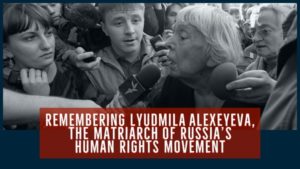 Sobol has exposed corruption at state companies and contested government tenders worth millions of dollars, The Atlantic adds:
Sobol has exposed corruption at state companies and contested government tenders worth millions of dollars, The Atlantic adds:
She has investigated the business empire of Yevgeny Prigozhin, the feared Kremlin-connected tycoon who was indicted in the United States for his alleged role in interfering with the 2016 election via an army of social-media trolls. And Sobol is representing the parents of dozens of Moscow children who last winter fell ill with dysentery after eating meals at government-run day-care centers catered by companies linked to Prigozhin.







